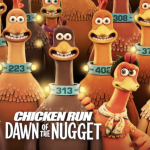Post war Japan is at its lowest point when a new crisis emerges in the form of a giant monster, baptized in the horrific power of the atomic bomb.
Chuck says:
Far more than just a simple monster movie, Takashi Yamazaki’s “Godzilla Minus One” is a moving examination of a nation dealing with societal trauma, the Japanese populace attempting to recover from massive damage inflicted on their land as well as their national psyche. Taking place just after World War II and before Ishiro Honda’s 1954 original, the story is a bracing examination of Japan during the post-war era, a once proud country, reduced to rubble, its citizens devastated, body and soul, forced to come to terms with their tattered heritage and uncertain future.
Kochi (Ryunosuke Kamiki) is just one of millions uncertain about what each day may bring; that he carries an inescapable stigma only makes matters worse. A kamikaze who refused to make the ultimate sacrifice, he returns home in shame, only to find his house destroyed, his family gone. Despondent and uncertain, his path crosses that of Noriko (Minami Hamabe), a young woman who has also lost everything yet has taken in an orphaned child to care for. These three form a makeshift family, struggling to cobble together some sort of day-to-day existence.
Fate shines on Kochi when he gets a high-paying government job gathering and disabling the thousands of ocean mines left behind by Allied forces. It’s dangerous work, but the salary comes in handy, while his co-workers, Akitsu (Kuranosuke Saski), Noda (Hidetaka Yoshioka) become trusted friends. The crew settle into a routine, but it’s violently disrupted by the United States’ nuclear bomb tests being conducted on nearby Bikini Atoll. They have not only awakened a dinosaur-like animal the natives refer to as Godzilla, but have transformed it into an unstoppable, atomic-fueled creature that is the personification of the nation’s fear.
While the seminal creature is the selling point, the focus of the film is the impact WW II had on the Japanese culture. Godzilla is a metaphor for the trauma Japan has faced, a shambling, fire-breathing, six-story symbol of the PTSD each of the survivors must contend with. Not only does he represent the past, but the future as well, the monster a threat that must be faced and contained if this society is to survive. His attacks in Ginza and Tokyo are tests, the suffering of the country made real. Denial regarding their place in the world, their responsibility for their plight and the uncertainty of tomorrow are all addressed when the populace – with no help from the government – make their final stand.
Yamazaki focuses on the human drama more than the kaiju shenanigans. It’s a risky approach that’s gone wrong in less talented hands, yet his script is grounded by characters we come to care for, made sympathetic by the fine work of the cast. Their efforts provide an emotional foundation for the film that not only elicits our sympathy but gives weight to the scenes of destruction.
And those moments are not only spectacular but terrifying. Yamazaki effectively combines practical and digital effects to create one nightmare scenario after another, the creature effortlessly cutting a swath through the cities, mass destruction and misery in his wake. There’s a fluidity to Godzilla’s movements that lend him credibility while the director’s camera placement – often from ground level- effectively drives home how terrifying being in the presence of a creature would be. There’s an urgency to these scenes that’s absent in the other Godzilla films, the filmmaker putting the viewer in the monster’s path, within his zone of destruction, again and again.
Whereas most of the franchise entries focus on the massive property damage done, “Zero” underscores the nuclear threat the monster represents. When using his atomic breath, the damage caused is reminiscent of the pictures taken of the destruction of Hiroshima and Nagasaki. A shot of a mushroom cloud rising in the distance as the monster witnesses his handiwork is genuinely chilling, this genre entry driving home the dire nature of the nuclear threat far more effectively than “Oppenheimer.”
In the end, this is a tale of redemption, and as such, the improbable ending is in keeping with Kochi and his brethren’s journey. Timely, exciting, and cathartic, “Godzilla Minus Zero” proves to be one of the biggest cinematic surprises of 2023, a movie that not only revitalizes the Japanese franchise but also serves as yet another bracing reminder of man’s atomic folly and the inescapable threat it continues to pose.
4 Stars




